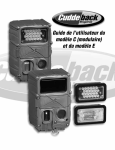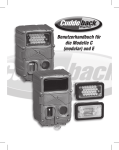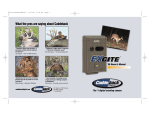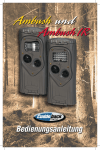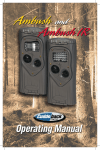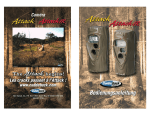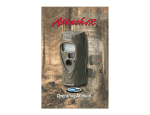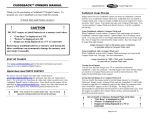Download CuddleBack Ambush Back Flash User manual
Transcript
C (modular) & E model User Manual The new Cuddeback cameras are the best cameras we have ever offered. The compact design does not sacrifice performance or image quality. In fact, C & E cameras are the highest performing Cuddeback cameras ever and feature a ¼ second trigger speed, 20MP images, and Zone Control. Cuddeback Instruction Manual for C & E Model Cameras Thank you for purchasing Cuddeback. You must read this manual to completely learn camera operation. Please update We never stop improving our products. Firmware updates allow your camera to be improved with enhanced performance and new features. Refer to Appendix A: Firmware for instructions on keeping your camera up to date with firmware updates. Like Us Let us know how you like our cameras and feel free to suggest improvements. In this connected world your reviews do make a difference. Please support us online by writing a positive review on any of the retail or forum websites. We thank you for your support. Battery Notice Remove batteries when the camera is not going to be used for an extended period of time. Failure to follow these guidelines may results in battery leakage which will damage your camera. 1 ✓Never mix old and new batteries. ✓Never mix different types of batteries. ✓Never mix lithium and alkaline batteries. ✓Replace all batteries at the same time. ✓Always remove batteries when the camera is not going to be used for a period of time. ✓Dispose of batteries properly as recommended by the manufacturer. SD Card Notice This Cuddeback camera is compatible with SD cards sizes 2GB to 64GB. Do not use SDXC cards. Micro SD cards will function with the proper adapter (usually included with the micro SD card). storage. Note – videos and time lapse images cannot be stored to internal memory. Images stored in internal memory must be copied to an SD card for retrieval. This feature is handy if you check a camera without a spare SD card. You can remove the SD card and take it home, yet still leave the camera a-field. When you return, all you need to do is install the SD card and transfer images from internal memory to the SD card. Treat your SD cards well. They are very sophisticated electronic devices made with billions of static sensitive transistors. Keep them dry and do not bend them. – Never insert a wet or damp SD card into your camera or computer – Internal Memory You can use this camera without an SD card. Up to 120MB of internal memory is available for image 2 3 Design Theory Cuddeback C & E model cameras have been designed to be as compact as possible, without compromising the performance, features, reliability, and image quality Cuddeback is known for. 1 4 1.User Interface is weather resistance and covered with a sealing door. This resilient rubber/plastic door is more robust than a conventional hinge door. 2.The SD card fits into a socket in the bottom of the camera. This prevents water from entering the camera when you check your camera in the rain. 6 5 3 The SD card socket is not spring loaded. We have found pull-out style sockets to be more reliable. 3.The battery door and SD card door are secured with brass thumb screws instead of breakable latches. 4.The Fresnel lens is user replaceable. 2 4 5.The Genius m ount is inexpensive and replaceable. If abused by a person or animal, the bracket will break before the camera. 5 6.DC INPUT – Only use Cuddeback CuddePower battery pack or cables. Maximum input voltage is 9 volts DC. DO NOT ATTACH CAMERA TO A 12 VOLT BATTERY! E Model Long Range IR (shown) C and E Models Cuddeback C & E models are very similar, but with these notable differences. C Model with Black Flash® module in camera and interchangeable Long Range IR and White Flash (color) modules along side. See Appendix C: C Camera for instruction on replacing flash modules. ✓C models feature exchangeable flash modules. By removing the flash bezel the user can replace the flash module as desired. This allows the user to convert the camera to strobe (white flash), IR, Black Flash®, or white LEDs (for night color videos) by changing modules. ✓The C model flash modules are also more powerful than the built-in illuminators in the E models. Therefore, the C models will have slightly longer flash illumination range. 6 7 Install batteries Install batteries by removing the 2 battery door thumb screws and removing the battery door. Insert 8 AA batteries as shown. Make sure to observe the correct polarity. BATTERIES CAN EXPLODE, LEAK ACID, OR IGNITE IF INSERTED INCORRECTLY. After batteries are inserted correctly, reinstall the battery door and fully tighten the 2 thumb screws. – + + – +– 8 IMPORTANT Be sure to insert batteries with correct polarity! We recommend Rayovac, Duracell, or Energizer brand batteries only. (Choose batteries carefully there is a difference, especially in cold temperatures). Lithium batteries provide better performance in cold (below freezing) temperatures. Refer to Appendix B: Battery Life for more information on maximizing battery life. Install SD Card Insert the SD card into the camera label side down. Do not force the card. If it does not go in easily, check to make sure you are inserting it correctly. You will break the card socket if you force the card. Insert SD card with label facing down or towards the back of the camera – + (SD/bottom panel door open) 9 Zone Control This camera is equipped with Cuddeback’s patent pending Zone Control. The motion sensor can be set to detect animals in a wide angle or a narrow view. Wide view will capture more animals but is more susceptible to triggering by non-target animals (such as birds) which can lead to blank images. Narrow view is very accurate and generates images with the animals centered in the image. Slide the Zone Control shutter to the appropriate position by placing your thumb as shown in the diagram (be careful not to damage the Fresnel lens). Slide up for narrow view Slide down for wide view 10 11 Quick Start Guide (EZ Mode) C & E camera front view (control panel door open) Flash LED’s Test LED (Long Range IR) Mode & More Keys Up & Down Keys Fresnel lens Display Zone Control shutter C & E camera bottom view (SD card panel door open) CuddePower battery connection SD card slot 12 C & E model cameras have 2 operating modes, EZ and ADVANCED. The default mode is EZ and we will explain that first. There are 6 LEDs named CLOCK, TESTS, COMMANDS, SETTINGS, ARM, OFF that correspond to user settings. There are 4 keys labeled MODE, MORE, UP, DOWN as well as an LCD display. The MODE key changes the mode as indicated on the LEDs and DISPLAY. Press MODE and TEST illuminates, press MODE again and COMMANDS illuminates, and so on. (Note – to conserve power the LEDs will turn off after 60 seconds). The MORE key displays additional actions for the selected MODE. The best way to think of this is MODE moves across the LEDs, and MORE moves down to display additional items. The UP and DOWN keys perform an action or command. 13 CLOCK, TESTS, COMMANDS, SETTINGS, ARM, OFF LEDs Mode & More Keys ( ) Up & Down Keys Setting the clock will demonstrate how the user interface functions. Clock Item Press MODE until the CLOCK LED is illuminated. The current time will be displayed. Press MORE and the date will be displayed. Press MORE again and the time will be redisplayed. Set the clock Press MODE until the CLOCK LED is illuminated. The time will be displayed. With the time displayed press UP or DOWN. The hour will start to flash 14 indicating you can set the hour. Press UP and/or DOWN as needed to set the HOUR. When correct, press MORE to advance to minute. Minute will begin flashing and use the UP and DOWN to set the correct minute. Press MORE again to complete the time setting. Set the date Press MODE until the CLOCK LED is illuminated. The time will be displayed. Press MORE and the date will be displayed. With the date displayed press UP or DOWN. The month will start to flash indicating you can set the month. Press UP and/or DOWN as needed to set the month. When correct, press MORE to advance to day. Day will begin flashing and you use the UP and DOWN to set the correct day. Press MORE to advance to the year. Press UP or DOWN as needed to set the correct year. Press MORE again to complete the date setting. Press MORE to return to the time display. 15 Test Item Press MODE until the TESTS LED is illuminated. After a short delay WALK will be displayed and walk-test is enabled. When test mode is enabled the RED LED (inside the flash module) will illuminate when a subject is detected. Walk back and forth (not toward) the camera to verify the detection zone. Pressing MORE from the WALK test will display TEST CAM. See Appendix E: Troubleshooting, Service & Support for instructions on how to use these commands to troubleshoot and test your camera. Command Item Press MODE until the COMMANDS LED is illuminated. The first menu item is BATTERY which displays the battery level. Press MORE to display additional Command items. When a Command item is displayed press UP or DOWN to activate the command (if required). BATT –––. Battery level displayed as FULL, GOOD, LOW or DEAD. Press UP or DOWN to display more information on battery status: BD – Battery Days shows how long the camera has been operating on this set of batteries. This count is reset to 0 when the batteries are removed. Diagram of “Walk” test 16 BI – Battery Images is a count of how many battery images have been taken on this set of batteries. This value is calculated based upon 17 how much battery power is used to take a picture or video. Day Images require the least amount of battery power and are counted as 1Battery Image. Video and Night Images require more power than day images and will increase the BI count by more than 1 depending upon how much power they consume. CLEAR. This command clears the SD card (WARNING: ALL FILES ON THE SD CARD WILL BE ERASED). Press UP or DOWN to activate this command. You will be asked to CONFIRM the operation. Press UP or DOWN again to confirm. If you do not want to CLEAR wait a few seconds and the CONFIRM prompt will vanish and the operation is canceled. IM COPY. This command copies images saved in internal memory (IM) to the SD card. Press UP or DOWN to initiate copying. You will be asked to CONFIRM the operation. Press UP or DOWN to confirm and images will be copied to the SD card. 18 DST MODE. Daylight Savings Time. For USA users you can have the camera automatically adjust for spring and autumn daylight savings time changes. Press UP or DOWN to select AUTO or OFF. In AUTO mode DST clock adjustments are done automatically. F/W VER. Displays the camera’s firmware version. LOAD F/W. This will load a new firmware file from a SD card. See Appendix A: Firmware section latter in this manual. SETUP. You can change setup mode to ADVANCED (ADV) or EZ. Default mode is EZ. Advanced Mode enables numerous additional features. Press UP or DOWN to change Setup Mode from EZ to Advance. See Advanced Mode section latter in this manual. STATS. Displays operating history statistics. Press UP or DOWN to display: Activation Date, Lifetime Days, Run Days, Lifetime Images, Lifetime Flash images. ✓ Activation Date is the day your warranty begins. It is set automatically when batteries are installed. 19 ✓Lifetime Days is how many days the camera has been operating. ✓Run Days is how many days the camera has been armed. ✓ Lifetime Images is how many images the camera has recorded. ✓Lifetime Flash Image is how many flash images that camera has taken. Settings Item Press MODE until the SETTINGS LED is displayed. This is where camera delay and video length is set. Press MORE to display these settings. (In advanced mode additional settings are enabled, see Advanced Mode section in this manual). Delay – this is the delay between images. Settings are FAP (Fast-as-Possible which is about 1 second) to 1 hour. Press the UP or DOWN key to select. Video – press UP or DOWN to select the length of the video or OFF if you do not want to record videos. 20 Armed Item Press MODE until the ARM LED is displayed. The word ARMING will flash on the LCD and then a 30 second count down will begin, after which the camera will arm and begin operation. Note – if the SD card is not installed or not functioning correctly the message CHECK SD will be displayed. Armed Info. When the camera is armed you can suspend operation and view the status and images count on the SD card or Internal Memory: 1. When the camera is armed press UP or DOWN. The battery level will be displayed. 2. Consecutive pressing the UP or DOWN key will display this data as appropriate. Note that SD data will only be displayed if an SD card is installed; and IM data will only be displayed if images are saved in Internal Memory. a. SD IMAGE is the number of images on the SD card 21 b. SD VIDEO is the number of videos on the SD card c. SD FREE is the amount of free space on the SD card d. IM IMAGE is the number of images saved in Internal Memory e. IM FREE is the amount of free space in Internal Memory 3. Press UP or DOWN again. The word WALK will be displayed and the camera is put into WALK TEST mode which causes the Test LED to illuminate when activity is sensed. 4. Press the UP or DOWN key again and the camera will arm. 5. You can leave the camera in any of these states and the camera will rearm in 5 minutes. We recommend leaving the camera in WALK states, as this allows you to verify the detection zone as you leave the area. 22 Auto Arm In any mode other than OFF the camera will automatically arm within 5 minutes. This eliminates you accidentally leaving the camera afield not armed. Off Item Press MODE until the OFF LED is displayed. You will be prompted to CONFIRM you want to turn the camera off. Press UP or DOWN to confirm. When OFF the camera is disabled and will not take images, nor will the camera auto arm. Use this mode when you do not want the camera to record images, such as for storage and transporting the camera. Press MODE key as needed to rearm the camera. We recommend removing batteries if the camera is not going to be used for a month or more. 23 Additional Topics Mounting Genius mount is more versatile than the traditional strapping the camera to a tree. The Genius mount is easy to attach to a tree and the camera can be quickly attached and removed without altering the camera aim and alignment. You can strap or screw the Genius mount to a tree. Tree or Pole Setup For best image quality, proper camera setup is important. Optimum setup for best image quality Open field with no back drop Area with tree line or other obstruction to reflect light back to camera Not Long Range IR 50 feet Recommended Area with tree line or other obstruction to reflect light back to camera Black Flash® 25 feet Camera mounted on tree Genius Mount Tree or Pole Strapped on IR camera mounted on tree Black Flash® camera mounted on tree Position your cameras about 3 feet off the ground Incorrect Tree or Pole Incorrect Correct On level ground your camera should be roughly waist high and aimed parallel to the ground. Screwed in 24 With C/E camera Correct In a downhill situation, make sure your camera aims downhill parallel to the ground. If you simply attach it to the tree you’ll shoot right over the deer. Correct In a uphill situation, aim the camera uphill, parallel to the ground. Failure to do so will result in images of the hillside ground. 25 Image Footer Icons The footer on Cuddeback images includes icons to provide status about the image. Note, Advanced mode is required to set burst mode and Camera ID. Close-up of image footer’s lower left corner showing moon phase, flash and burst mode icons Moon Phase – the far left icon will show the moon phase at the time the image was taken Flash Mode – the second icon indicates if the flash was used or if it was a daytime (non-flash) image (white bolt) – indicates a strobe (white) flash (red bolt) – indicates an IR flash was used 26 (black bolt) – indicates no-glow Black Flash was used (sun/cloud) – indicates that the flash was not used Burst Mode – if the images were taken in burst mode this icon will appear. The letter a, b, c, d, or e will indicate image position in the burst sequence. This icon will not appear if the image count was set to 1 (see Advanced Mode section for more on burst mode). Camera ID – if you set Camera ID to a non-zero number it will be displayed here. 27 SD Card Organization Files are saved on the SD card in this format: • Copies images from SD card to PC with a simple mouse click Images are saved in this folder SD:\DCIM\100CUDDY • Organizes images by year, property, and camera location Time lapse images are saved in this folder SD:\DCIM\200CUDDY • Zoom and enhance images Videos are saved in this folder SD:\DCIM\300CUDDY If you elect to record an image and a video, you can match up the video to the corresponding image using the file time stamp. The video and corresponding image will have identical time stamps. NOTE – Our PC program, Trophy Room, will match up the video to the image for you. Trophy Room Cuddeback offers a free Windows PC tool to manage your trail camera images. Trophy Room is valued at over $100, but is free to all trail camera users. • Automatically determines buck/ doe/fawn ratios • Prepare reports of animal activity versus moon phase • Predict deer movement based upon moon phase • Automatically keeps your Cuddeback cameras updated with latest firmware Download a free copy of Trophy Room at http://cuddeback.com/TrophyRoom • Works with all brands of trail cameras 28 29 Detection Range The motion sensor detects the temperature difference between the air and the animal. The range at which an animal will be detected varies with animal size, movement speed, air temperature and the heat of the animal. detected because of the wing movement and speed. 1. Detection range will be reduced in hot (over 80˚ F) temperatures. Using the camera in cold conditions 2. Animals walking directly towards the camera may not be detected until they are very close (10 feet) to the camera. 6. Stationary animals may not be detected. An animal standing in front of the camera may not be detected until it moves. Be aware of these things if you use your camera in extreme cold (below 0˚C or 32˚F). 1. Battery life may be reduced by as much as 50% or more. 3. Animals with thick hair (deer in winter) will be harder to detect than animals with a thin summer coat. This can result in reduced detection range in winter. 2. Night illumination range may be reduced because cold batteries typically cannot deliver the same amount of power to the LEDs as warm batteries. 4. The larger the animal the further away it can be detected. For example, a deer may be detected beyond 50 feet, but a fox may only be detected to 25 feet. 3. Flash cameras are not as affected by cold as much LED based cameras are. 5. A moving animal is detected better than stationary animals. A small flying bird can be 30 4. Lithium batteries operate much better in cold conditions and will allow the night illumination to be about as good as during warm conditions. 31 5. We recommend you use a longer delay, around 30 seconds or more, to give the batteries a rest period. 5. Image aspect ratio selection (wide or full) 4 x 3 (FULL) 16 x 9 (WIDE) 6. We recommend you do not use videos or limit video length to 10 seconds. If you want to record videos we recommend you use lithium batteries in cold conditions. This concludes the Quick Start Guide and the explanation of EZ Mode. See Appendixes for other important topics. If you elect to use ADVANCE Mode please continue reading. 6. Image size selection (1MP, 5MP, or 20MP) 7. Camera ID setting Advanced Mode Advanced mode provides these additional features: Enabling Advanced Mode 1. Separate delays for day and night operation 2. Time Lapse mode 1. Press MODE until the COMMANDS LED is illuminated. 3. Burst mode 4. Enhanced video/image programming 32 33 2. Press MORE until SETUP is displayed. 3. Press UP or DOWN to select ADV MODE. 2. Press MODE consecutive times to scroll through the available test items. a. CLEAR – press UP or DOWN to clear the SD card. CONFIRM will be displayed. Press UP or DOWN to confirm that you want to clear the SD card. b. ASPECT – this selects the format of the image. Select WIDE view or FULL view. WIDE is the modern 16 x 9 format, and FULL is the traditional 4 x 3 format. 4. Press MORE to retain the viewed setting. The following sections explain the differences and additions to topics covered previously. Command Menu Advanced mode enables additional COMMANDS that allow you to change camera performance. 1. Press MODE until COMMAND LED is illuminated 34 c. STILL SZ – select 5MP or 20MP. d. LAPSE SZ – select 1MP, 5MP, or 20MP. Note, the bigger the image size the more space on the SD card is required. We recommend 1 MP when time lapse is set to 1 minute or less. DST MODE – For USA users select daylight e. saving time mode to AUTO for automatic time adjustment for daylight savings time. For other users select OFF. f. F/W VER – firmware version. 35 g. LOAD F/W – Press UP or DOWN to load a new firmware from a SD Card. See Appendix A: Firmware section in the manual. Press MODE until SETTINGS LED is illuminated 1. h. SETUP – Press UP or DOWN to select EZ MODE or ADV MODE. a. DAY will be displayed to indicate that the next settings only affect daytime camera operation. i. CAM ID – Select a number from 0 to 250 to have printed on to the image. This can be used for easier image identification. j. RESET – press UP or DOWN to reset the camera to factory defaults. k. STATS – Press UP or DOWN to view statistics about your camera. Displayed are Activation Date, Run Days, Lifetime Images taken, & Lifetime Flash Images taken. Settings Menu Advanced mode enables additional SETTINGS menu items that provide more versatile camera deployment. (We recommend reading this entire section first and then read it again while working with your camera.) 36 2. ADV MODE will be displayed. Press MORE consecutive times to view the available settings. a.i. D/ DELAY a.ii. D/ IMAGE a.iii. D/ VIDEO a.iv. D/ LAPSE b. NIGHT will be displayed to indicate that the next settings only affect nighttime camera operation. b.i. N/ DELAY b.ii. N/ IMAGE b.iii. N/ VIDEO b.iv. N/ LAPSE 37 3. This system allows you to set daytime operation differently than nighttime operation. Here is a description of these settings: DELAY – sets the delay between photographs. a. Settings are OFF & FAP to 1 hour. OFF means the camera will not record motion triggered activity. Select OFF if you only want time lapse photos. FAP indicates Fast-as-Possible, which is about 1 second but will vary depending upon image size, video length, and SD card speed. b. IMAGE – sets the number of images to record with each detection. Settings are OFF, 1, 2, 3, 4, 5. OFF indicates the camera will not record an image. 1 thru 5 is the burst count of images to record. 30 sec. OFF indicates the camera will not record a video. d. LAPSE – this is the time lapse setting for time triggered images. Settings are OFF and the range 10 sec to 24 hours. By separating day and night operating parameters the camera becomes very powerful. However, it is important to pay attention to these settings as it is possible to set the camera to not record activity the way you intended. Here is just a sample of things these settings allow you to do: • Record time lapse images without motion images • Record time lapse images and motion images • Record only video, only images, or video & images • Use time lapse during the day, and motion sense at night c. VIDEO – sets the length of the video to record. Settings are OFF, 10 sec, 20 sec, 38 • Record videos during the day, and images at night 39 • Record burst images during day, and a single image at night Arm Menu When the camera is arming an additional screen will be displayed to remind you of the camera settings. The screen will show the status of the still, video and time lapse settings: Day Time Mode Night Time Mode IVL IVL Where: I indicates still image is enabled V indicates video is enabled L indicates Time Lapse is enabled – indicates the feature is disabled The status menu will be displayed for 5 seconds and then a 30 second count down will begin. When the countdown reaches 0 the display will clear and the camera is armed. 40 Appendix A: Firmware We never stop improving our products Firmware updates allow your camera to be improved with enhanced performance and new features. We strongly recommend you visit our website prior to camera deployment to check for firmware updates. Updating your Cuddeback camera firmware is a 2 step process: 1) retrieving firmware from the Cuddeback website, and 2) loading the firmware onto your camera. 1. How to retrieve firmware updates: a. Occasionally visit our website and check if new firmware is available. Visit Cuddback. com and click SUPPORT. Select your product and click PRODUCT UPDATES to see if there is new firmware available. b. Windows PC users can install Cuddeback Updater. This small PC program will check for new firmware and inform you when firmware is available. You can download this program at cuddeback.com/updater. 41 c. Use our Trophy Room Windows PC program which will automatically inform you when new firmware is available. You can download Trophy Room at http://cuddeback.com/ TrophyRoom d. Register your camera cuddeback.com and opt-in to our emails. We will email you new firmware when it is available Loading firmware onto your Cuddeback camera: 2. a. Copy the firmware file to your SD card. b. Insert the SD card into your Cuddeback camera. c. Press MODE until COMMANDS LED is on. d. Press MORE until LOAD F/W is displayed. g. The LCD display will display BUSY and the LEDs will illuminate. When finished the time will be displayed and you can remove the SD card. h. You can use the same SD card to update all your Cuddeback cameras. The same firmware file will update all recent Cuddeback models (Attack, Ambush, and C & E models). Appendix B: Battery Life It is impossible to predict exactly how long batteries will last in a camera. Battery life varies greatly and depends upon battery quality, temperature, operating days, number of images taken, video mode, etc. Depending on usage and other factors you may get as long as 12 months on a set of batteries, or only weeks. e. Press UP to begin. CONFIRM will be displayed. Press UP to confirm. Here are some facts that will help you understand battery life. f.DO NOT REMOVE THE SD CARD until the time is displayed. 1. Higher quality batteries last longer. We recommend only Rayovac, Energizer, and Duracell brands. 42 43 2. Older batteries will generally have less power than newer batteries. Batteries purchased many months ago may not last as long as batteries purchased recently. 3. Temperatures below 32˚F (0˚C) may reduce battery life 50% or more. 4. The more images taken the fewer days the camera will operate. Video consumes more power than still images. 5. 6. Night images require considerably more power of day images. 7. Night video requires considerably more power of day video. 8. Night illumination range will be reduced as battery power weakens. 9. Lithium batteries will perform better in cold temperatures, and may perform better overall. You can maximize battery life by using the camera delay and video settings wisely. 44 1. A short day delay (FAP to 5 seconds) will deplete batteries more quickly than a longer delay (15 seconds to 1 minute). 2. Using shorter video length (10 seconds) will extend battery life. 3. At night a longer delay (15 second of more) will extend battery life. 4. Minimizing burst mode will extend battery life (select 1 or 2 images). Recommendations to maximize battery life Trails and Scrapes. On a trail or scrape a FAP or 5 second delay is okay to use because trails typically do not have a lot of activity (compared to feeders and food plots). Feeders. A short delay on a feeder will generate a lot of images and can deplete batteries quickly. Do you really need a 5 second delay to capture dozens of images of the same animal? A delay of 15 seconds to 1 minute will extend battery life and still capture all the deer. 45 Food Plots. A short delay is typically okay as deer will be moving around and you don’t want to miss any. However, FAP can deplete batteries quickly if a deer remains feeding in front of the camera. A 5 or 15 second delay may be a better choice to extend battery life. Want even longer battery life? The CuddePower Battery Booster allows C & E model cameras to operate from 6 D batteries. 6 D batteries have 4 times the power capacity of 8 AA batteries. This extra power provides a higher quality night image, better cold weather performance, and much longer battery life. Using the CuddePower Battery Booster will show many users how to run their camera for over 12 months on 6 D batteries, even in freezing conditions. Appendix C: C Model Camera C model cameras have replaceable flash modules. Never operate a camera without a flash module installed. Make sure to install the rubber gasket correctly. 1. Remove bezel 2. Remove module CuddePower battery power pack (shown with and without camera) 46 3. Move rubber gasket from module and attach to new module 47 Appendix D: CuddeBacker & Photo Contest 4. Insert into camera 5. Assure gasket and (it only fits one way) module are seated correctly Got a great picture? A big deer or a special scene? A funny situation or beautiful colors? We want to see them and give you a chance to win a free Cuddeback. Visit http://cuddeback.com/contest to enter your best pictures into our photo contest. Contest entry also allows you to become a CuddeBacker and receive special promotions, rebates, and other discount offers. Appendix E: Troubleshooting, Service & Support If you suspect your Cuddeback is not functioning correctly, follow these simple steps: 6. Replace bezel and secure with screws (do not over tighten, but make sure screws are snug) 48 Press MODE until the TESTS LED is illuminated. Press MORE and TEST CAM will be displayed. Diagnose allows you to test your camera for proper operation. Follow these instructions to test your camera: 1. Press UP to enable test commands. Press UP again to CONFIRM. After each test press MORE to continue to the next test. 49 2. RESET is the first command. Pressing UP will reset the camera to factory settings. This command is useful if you think the camera settings are incorrect. We always recommend resetting the camera before performing additional diagnostic steps. Press UP and confirm and reset the camera. 3. BATTERY level will be displayed next. If Battery level is LOW or DEAD we recommend you replace the batteries. Press UP to view the Battery Image and Battery Day counters. 4. BATTERY LOAD test is next. Press UP to begin the battery load test. This test will display a value from 10 (low) to 99 (high). If the number is below 50 we recommend you replace the batteries. 5. FILTER verifies the camera filter works correctly. Press UP to test and you should see the filter move inside the camera. 6. IR LED tests the camera’s illumination LEDS Press UP to turn on the LEDs. NOTE: for Black Flash you will not be able 50 to see the LEDs turn on. Use a cell phone camera to view the LEDs. (Note – some cell phones, like the iPhone 5S, will not display the IR LEDs.) SD CARD verifies your SD card is functioning. 7. Press UP to test your SD card. This test will write a file to the SD card and read it back to verify the SD card is functional. 8. IMAGE - Press UP or DOWN to take a still image. You can view this image on your PC or other viewing device to assure it is OK. 9. VIDEO - Press UP or DOWN to record a video. You can view this video on your PC or other viewing device to assure it is OK. For additional product support visit http://support. cuddeback.com. You can also email us your questions by visiting http://cuddeback.com/email. 51 Appendix F: Warranty Battery Booster FREE Extended Warranty with online registration! Extend the warranty on your Cuddeback camera to 24 months by registering your purchase at www.cuddeback.com. Click “Support” then “Product Registration”. Activation required within 2 weeks of registration. 52 CuddePower® Battery Booster allows C & E model cameras to operate on 6 D batteries. Increasing power, image quality and extended battery life. • Four times the power capacity of 8 AA batteries • Provides a higher quality night image • Better performance in cold/freezing conditions • Much longer battery life 53 Put a Genius Mount bracket in all your favorite hunting spots! Patents Pending For use with all Cuddeback ® Tilt Mount scouting cameras Lock Mount CuddeSafe® Protects your Cuddeback ® camera from bears, thieves and the elements! 54 • Fits Cuddeback C & E model scouting cameras • Heavy-duty, bear-proof metal design • Easy to install (lag-bolts to tree); accepts a padlock • Makes for easier card checking/battery replacement Secure your Cuddeback with the included lock clip Pan & Tilt Post Mount Put your Cuddeback virtually anywhere! No tree needed! 55 Approvals: FCC, CE, ROHS. This device complies with Part 15 of the FCC Rules. Operation is subject to the following two conditions: (1) this device may not cause harmful interference, and (2) this device must accept any interference received, including interference that may cause undesired operation. 56 Designed in USA with ¼ Second Trigger Speed www.cuddeback.com NON TYPICAL, INC., PO Box 10447 Green Bay, WI 54307-0447































